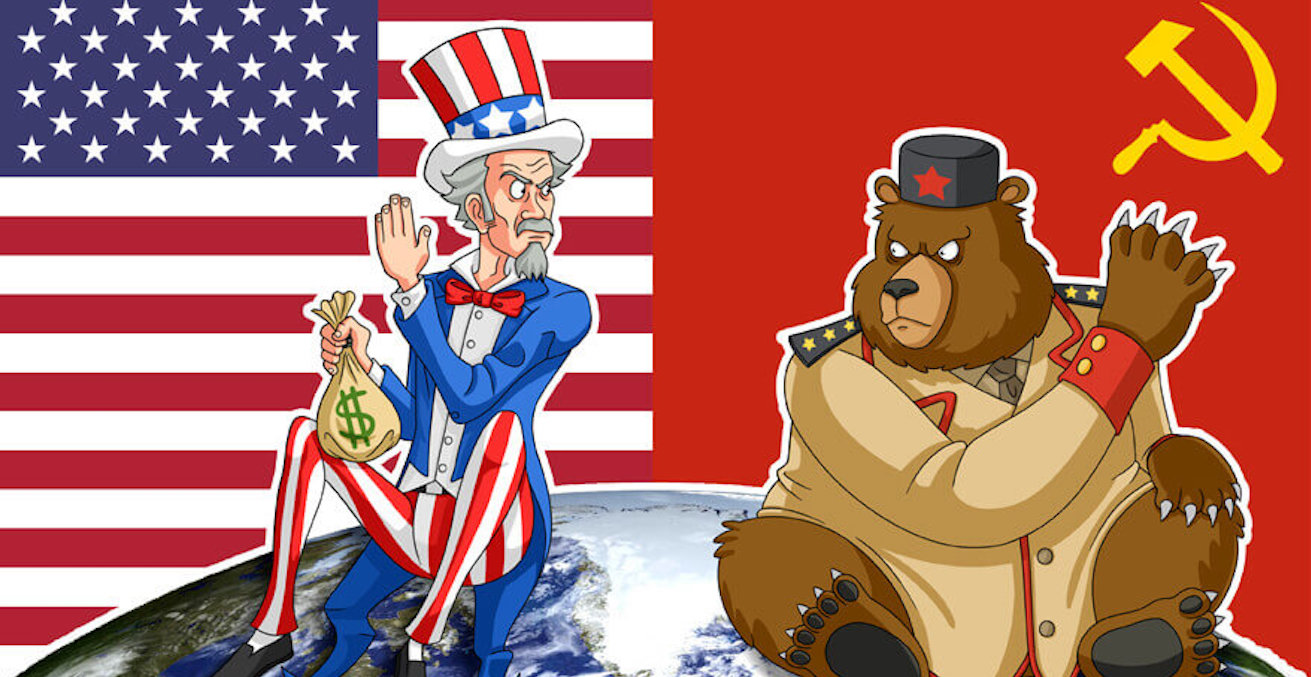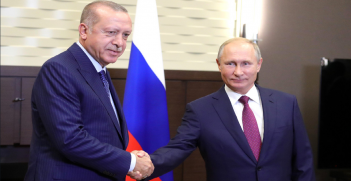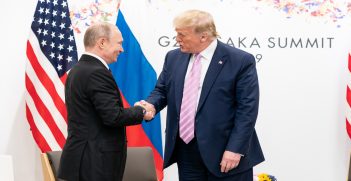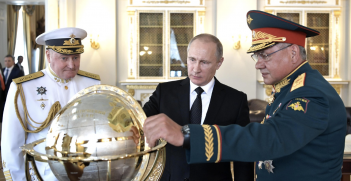Russiaphobia and the Perils of a New Cold War

Where all think alike, no one thinks very much. There is no question that Russiaphobia is on the rise across the West, especially Washington, and it shapes our thinking about the Kremlin. What’s missing here is some perspective.
From Washington and Canberra to London and Brussels, western leaders have indulged in the rhetoric of moral indignation, punished Moscow with economic sanctions and treated Vladimir Putin as a pariah in world affairs. The media consensus is also clear: the Bear is on the prowl and Putin is upending what has recently been termed the rules-based liberal international order.
Since the collapse of Soviet Communism, the western nations have rubbed Russia’s nose in its Cold War defeat and failed to take into account its strategic sensibilities. A decade ago, in 2008, Paul Keating warned
Russia is the only country in the world with the capacity to massively damage the United States to the point of seriously maiming it. And ditto for Western Europe.
He asked “Wouldn’t you think that when the Russians surrendered their empire in 1990, US policy would have been adept enough to find an intelligent place for them in the overall strategic fabric?” Instead, Washington “ring-fenced Russia, treating it as a virtual enemy, with its western European and central European clients egging it on.”
The Western critics of Russia come in different shapes and sizes: Some are unreconstructed Cold War Warriors; some are liberal interventionists or Wilsonian idealists; while others are motivated by a hatred of Donald Trump. Whatever their motivations, there is clear evidence of anti-Russian hysteria or Russiaphobia in the West. So much so that whenever anything bad happens we blame it on the Russians, whether there is any evidence or not.
The critics make several arguments about the Russian menace. Here are four of them:
Ukraine
When Russia seized Crimea in 2014, the incursion was widely denounced as naked aggression akin to Nazi Germany’s expansionism in the mid-to-late 1930s. According to the likes of Hillary Clinton and John McCain, Putin was the new Hitler. Never mind that Ukraine is a conduit for gas exports to Western markets. Never mind that ethnic Russians comprise about 60 per cent of Crimea’s citizens and that a large percentage of the Crimean population supported the referendum to leave Ukraine for Russia. Never mind that Putin’s intervention in Crimea in early March 2014 was a reaction to the Western-backed coup to bring down the democratically elected, pro-Russian regime in Kiev on 21-22 February 2014. Never mind that the brutal Ukrainian military assault on those ethnic Russian breakaway regions, Donetsk and Luhansk in eastern Ukraine, in April 2014 sparked a refugee crisis and the deaths of about 10,000 civilians.
Putin’s rational calculations are based on an age-old truth of geopolitics: that a great power doggedly protects its vital national interests in its near abroad. Indeed, a sphere of influence is a key characteristic of any great power, authoritarian or democratic. Many Americans, guided by a sense of exceptionalism, think they are immune to the historic tendencies of power politics. But when liberals and neo-conservatives slam Russia’s behaviour, they should recall the many US military interventions in the Caribbean and Central America. None of this is extraordinary; it is the way the world works, and always has.
Syria
Russia’s intervention in the Syria’s civil war in September 2015 was widely denounced at the time. But Moscow was merely rescuing its Shiite-aligned client in Damascus from Sunni insurgents. Nothing odd about that: a year earlier the US rescued its Shiite client in Baghdad from Sunni insurgents. Putin feared that if Bashar al-Assad’s regime fell, Russia’s presence in western Syria and its strategic military bases on the Mediterranean would be gone.
True, Russia’s many air strike campaigns have led to senseless deaths of many innocent Syrians. Still, the consequences of removing Assad—an outcome that President Barack Obama, Secretary of State Hillary Clinton and British Prime Minister David Cameron had enthusiastically encouraged—would have been even worse. The regime would have collapsed and its Alawite army would have crumbled. Sunni jihadists such as Islamic State and Al Qaeda’s Syrian affiliate Al-Nusra Front would have exploited the security vacuum and dominated all of Syria. The ethnic minorities (the Alawites, Shi’ites and Syrian Christians) would have been massacred. And there would be the flight of millions more refugees into Lebanon, Jordan and Turkey.
Russian meddling in the US election
It is true, several Russian actors in cyberspace peddled fake news on the Internet. Yet there is no evidence whatsoever these meddlers had anything to do with the Russian government. As it happens, many reputable journalists have raised serious questions about whether Moscow hacked the Democrats’ emails, which in fact show that the Democratic National Committee establishment had colluded with Hillary Clinton against her rival Bernie Sanders in the 2016 Democratic primaries. There is still no public evidence that Putin’s regime gave emails from Clinton’s campaign chairman to WikiLeaks in the lead-up to the 2016 election.
Special prosecutor Robert Mueller is leading an investigation into Russia’s role in the US election, including claims that Moscow was in cahoots with the Trump campaign. The key question at the heart of this investigation is not whether the Russians had dirt on Clinton, including damaging emails. The issue is whether the Trump campaign was working with Russian officials to acquire and disseminate information about her that could be used to tilt the 2016 election. After 18 months of investigations, there is no email or document or witness testimony that proves Russia-Trump collusion. In short, there is still no smoking gun.
The Skripal affair
In the past few weeks, Australia, the US, and several European Union nations have joined forces with Britain to expel Russian diplomats from their nations. The decision is based on the widespread view that the Russian regime of Vladimir Putin is responsible for the poisoning of Sergei Skripal and his daughter in England a month or so ago. At this stage, however, there is still no evidence – none – about the identity of the culprit. And Skripal and his daughter appear to be recovering well. So the nerve agent is unlikely to be military grade. Otherwise, it would have killed them and others within minutes.
As the British conservative columnist Rachel Johnson (Foreign Minister Boris’s sister) has argued, it is better to take our time to get the bottom of this crime so that we can punish the perpetrators, whomever they may be. This is especially true when you realise Putin had no reason to poison the spy and his daughter and good reasons not to do it. Remember, Moscow did not kill Sergei Skripal after he was arrested and jailed in 2004. Nor was he denied a spy swap deal with Britain in 2010. Why would Putin exacerbate his already strained relations with the West now by trying to assassinate the former double agent at a time when Putin is desperately keen to ease Western sanctions on Russia?
Who precisely has proved the hit on Skripal came from the Kremlin? When a chemical weapon is suspected of having been used, the Organisation for the Prohibition of Chemical Weapons is supposed to determine the sample. That has not happened. Nor has the Russian government been given access to the sample. So we have no evidence, but there are enormous and negative consequences from the May government’s decision to escalate tensions with Moscow. To ask again: what is so wrong with establishing proof before the West escalates a very dangerous international situation?
Perspective
What’s missing here is some perspective. The reality is that Russia is a declining power, it is ageing fast, its economy is hitched to commodities and its military is clearly not well placed for costly occupations abroad. But if humiliated further and made desperate, Russia could be dangerous in the way a cornered, wounded animal is dangerous. And remember, it still has a vast arsenal of nuclear weapons.
Why place so much importance on a region where no US army has ever fought and where Russia has a huge tactical advantage in both conventional and short-range nuclear forces and where the balance of resolve favours Russia, because it cares much more about Ukraine’s future than the West?
In the West today, supporting engagement with Moscow cannot be discussed openly without inspiring immediate hysteria. But we should try to understand the historical background to the tensions between Russia and the West before they spiral out of control. And we should ask why we in the West can’t work with the Kremlin when interests overlap, as they do in defeating Sunni extremists and keeping in check a rising China. Once we do that, and start treating Russia with the respect and dignity it deserves, we may reach the real peace that we have failed to achieve since the end of the first Cold War.
Tom Switzer is executive director of the Centre for Independent Studies and a presenter on the ABC’s Radio National.
This is an edited version of a speech delivered on 10 April at the AIIA NSW on “Russiaphobia and the Perils of a New Cold War“. The speech is available in full here.
This article is published under a Creative Commons Licence and may be republished with attribution.





